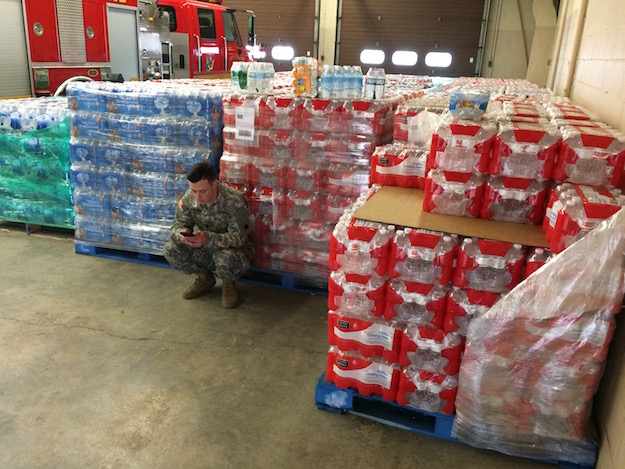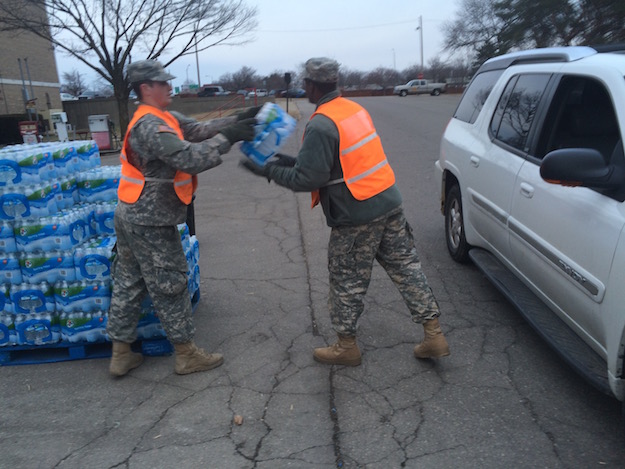Flint Is Burning Through Millions of Plastic Water Bottles

By:
FLINT, Mich. — At Fire Station #1 — one of five fire stations in Flint that authorities re-purposed for dual use as water distribution centers — Corporal Jack King leans against a five-foot-high pallet of water bottles as though they're furniture. Outside, two of his fellow National Guard service members hand out cases into open car doors as drivers pull up — case after case, car after car, with never more than a minute between.
"This would only last maybe half a day at this center," King says, looking over the small sea of water bottles that sit behind the pallet he's leaning on. "I'd say we give out roughly 3,000 cases a day at this service center." He estimates that Flint's four additional service centers do the same.
 Steven Thomas Kent/attn:
Steven Thomas Kent/attn:
At 15,000 cases of water and 24 bottles per case, then, that's 360,000 bottles of water — every day.
Even as donations of bottled water pour into Flint in light of the city's lead-contaminated water crisis — including well-publicized efforts from companies like PepsiCo and Walmart, and from celebrities like Diddy, Eminem, and Mark Wahlberg — a number of media outlets and environmental activists have expressed growing concern at the environmental impact of the city's massive plastic bottle consumption, especially in light of Flint's low recycling rates.
Filmmaker Michael Moore penned a letter on January 28 urging Americans not to send bottled water to Flint. Instead, he called for a state-funded, FEMA-led effort to install temporary water systems in each home.
 Michael Moore - michaelmoore.com
Michael Moore - michaelmoore.com
In the passionate letter, as posted to his website, Moore wrote:
100,000 bottles of water is enough for just one bottle per person – in other words, just enough to cover brushing one’s teeth for one day. You would have to send 200 bottles a day, per person, to cover what the average American (we are Americans in Flint) needs each day. That’s 102,000 citizens times 200 bottles of water – which equals 20.4 million 16 oz.bottles of water per day, every day, for the next year or two until this problem is fixed (oh, and we’ll need to find a landfill in Flint big enough for all those hundreds of millions of plastic water bottles, thus degrading the local environment even further). Anybody want to pony up for that? Because THAT is the reality.
Flint's government has also been issuing water filters to residents, but many taps show lead concentrations far over the quantity that these filters are rated to remove, as ATTN: reported last week.
The environmental impact of bottled water consumption has long been a source of concern for environmental activists and conservation groups. The non-profit organization The Water Project says that U.S. landfills are already overflowing with 2 million tons of discarded water bottles, and that plastic bottles take over 1,000 years to biodegrade and produce toxic fumes if incinerated.
Additionally, the National Resources Defense Council reports that only about 13 percent of plastic water bottles end up being recycled, with the rest ending up in landfills. That figure matches up with a report from Michigan Radio estimating that 13 to 16 percent of Flint residents use their city's curbside recycling program.
 Steven Thomas Kent/attn:
Steven Thomas Kent/attn:
Despite the staggering consumption of bottled water, state officials have insisted that the resulting tons of empty plastic vessels don't have to end up in landfills. Michigan Lt. Gov. Brian Calley even tried to paint the plastic pile-up as a long-term positive, saying that it provided an opportunity to address Flint's low recycling rates.
"We have an opportunity here not just to deal with the issues, but to leave behind a legacy of recycling here in Flint," Calley told MLive.
To start addressing the problem, Calley announced a recycling plan late last month that would provide Flint residents with more options for recycling plastic water bottles, including added drop-off sites for recyclables and increased promotion of the curbside pickup already offered to Flint residents.
Private companies in the area have also made efforts to offer extra recycling solutions; for example, local hazardous waste hauling company Young's Environmental Cleanup Inc. announced on Facebook a roll-out box at their corporate headquarters where residents could drop off empty water bottles.
 Steven Thomas Kent/attn:
Steven Thomas Kent/attn:
Despite any potential silver linings, it seems inevitable that a sizable portion of the millions of plastic water bottles surging through Flint will end up in landfills or as litter, based on the existing evidence and past data on plastic recycling rates. And besides the massive buildup in landfills as plastic bottles take ages to biodegrade, massive consumption of bottled water drives climate change, too: The Pacific Institute estimated in 2007 that producing bottled water in the U.S. the previous year required the equivalent of more than 17 million barrels of oil — not including the energy for transportation — and produced more than 2.5 million tons of carbon dioxide.
One non-profit organization, CannedWater4Kids, even suggested on Twitter that distributing water in cans might be a better solution. Cans have the highest recycling rate of any type of beverage container in the U.S., significantly higher than glass and plastic, according to the organization's website.
At Flint's fire stations, however, National Guard service members said that most residents remain hugely grateful for the donated water efforts. Specialist Thomas Jones, 22, said that residents aren't happy to rely on bottled water either, but that the donation efforts are most of Flint's only option for uncontaminated water.
"This is part of people's daily lives now, lugging cases of water around," he said. "That's not something they wanted to be doing, but they have to do it. We're just glad we can be here to help them."
Republic Services, the company Flint contracts for its trash and recycling services, did not respond in time for publication to email and phone requests from ATTN: for a comment on whether the awareness efforts had increased Flint's recycling rates.
You can learn more about the ongoing water crisis there in this ATTN: video:
Correction: A previous version of this article mistated Specialist Thomas Jones' rank as Private First Class Thomas Jones. ATTN: regrets this error.
